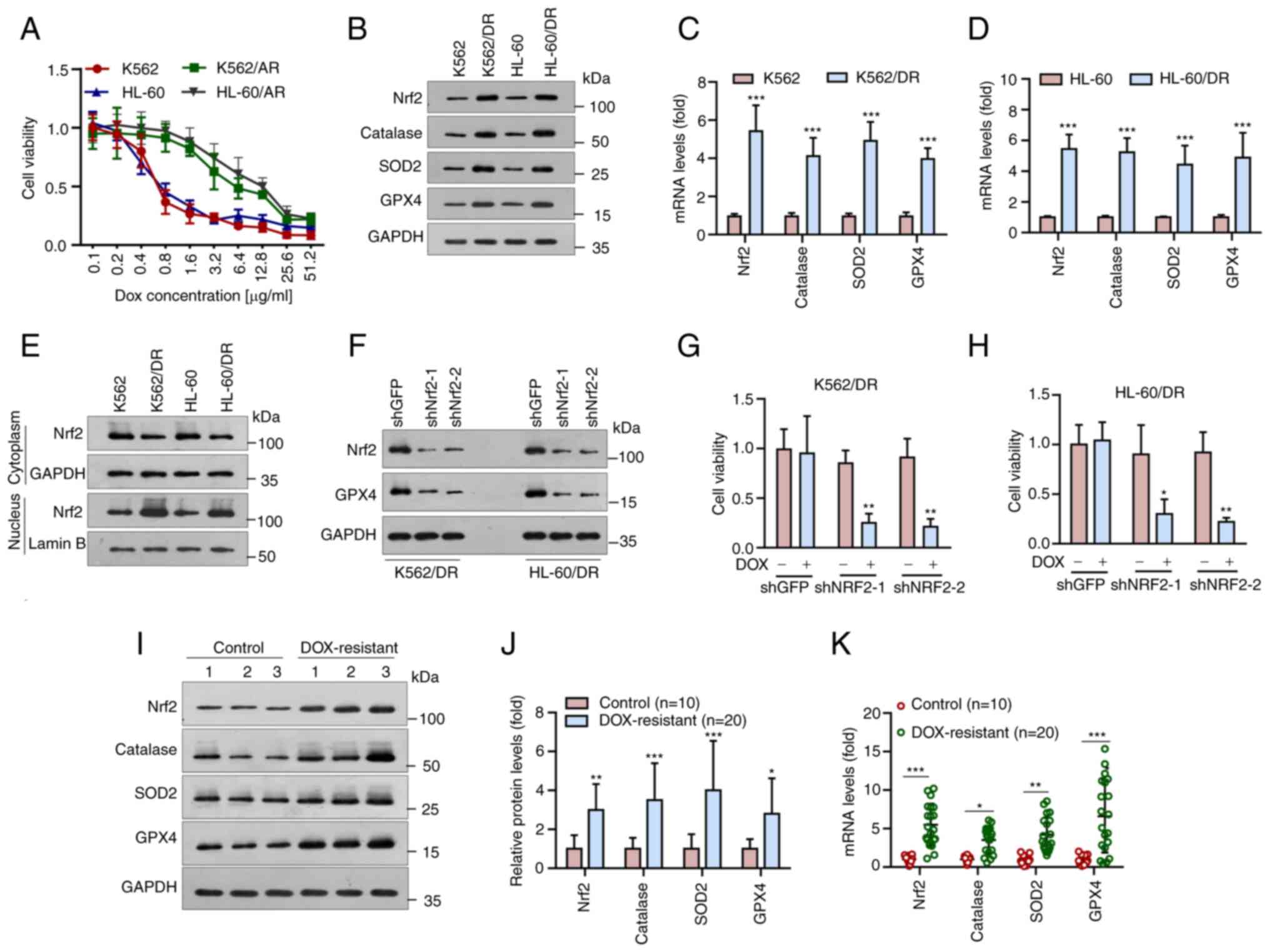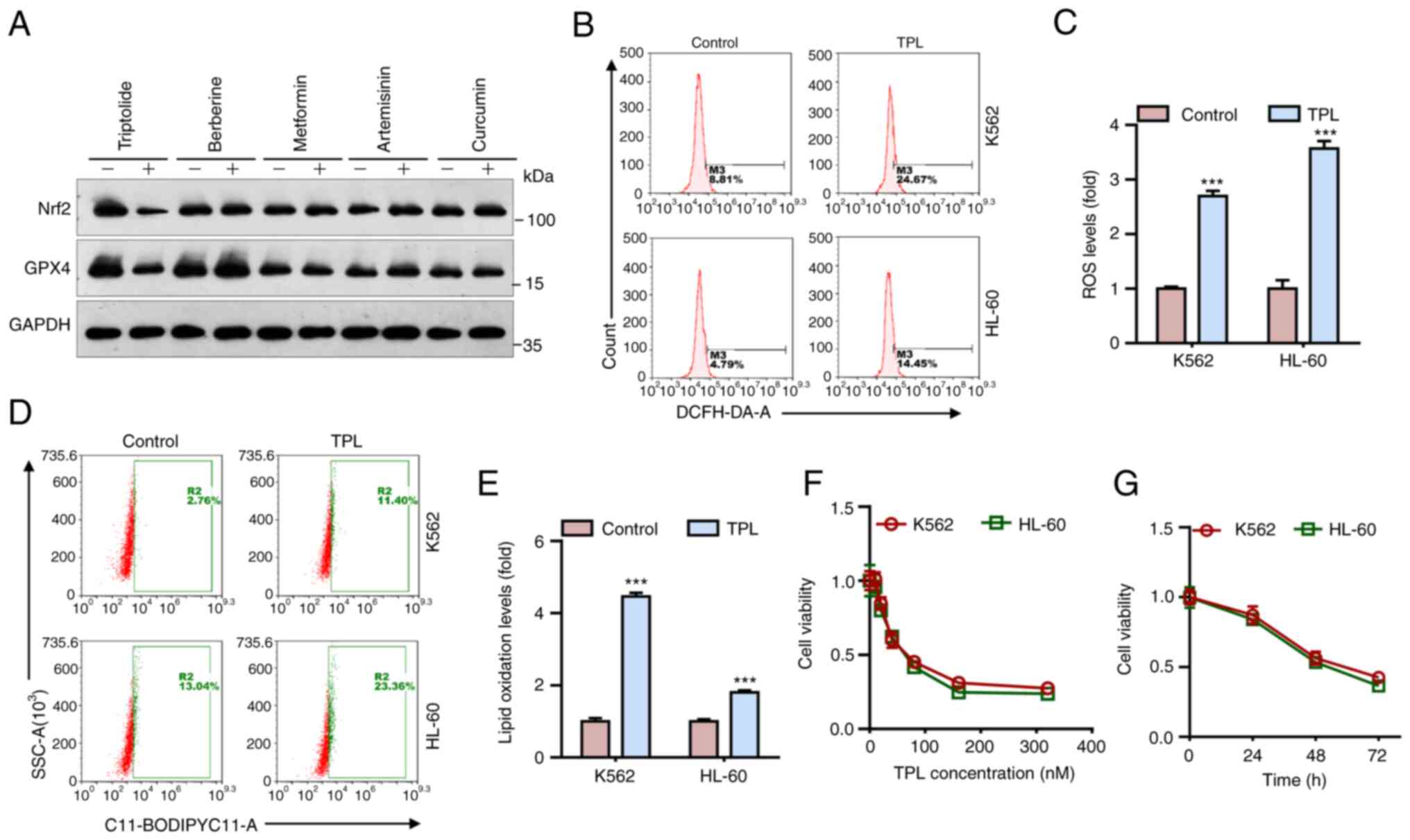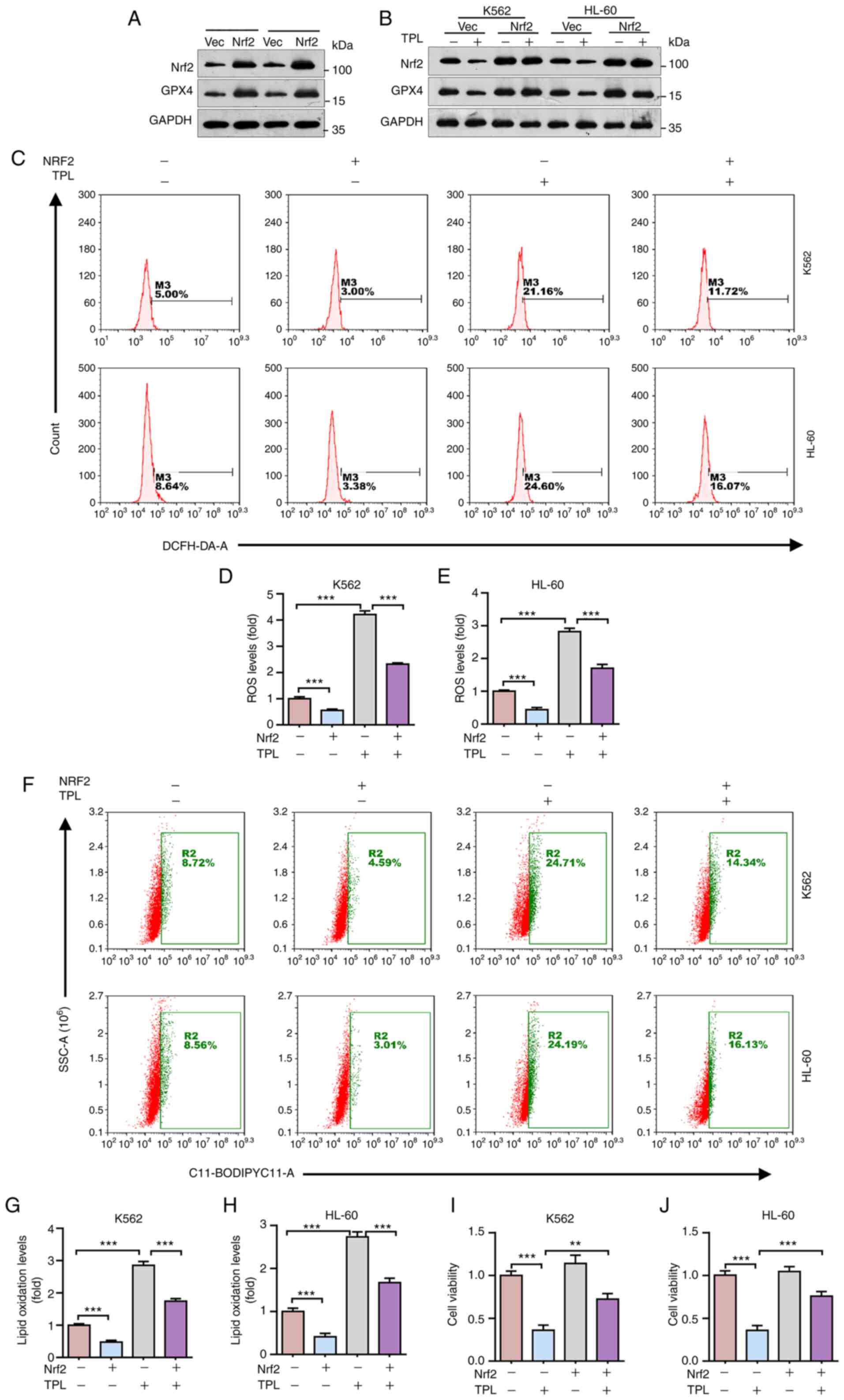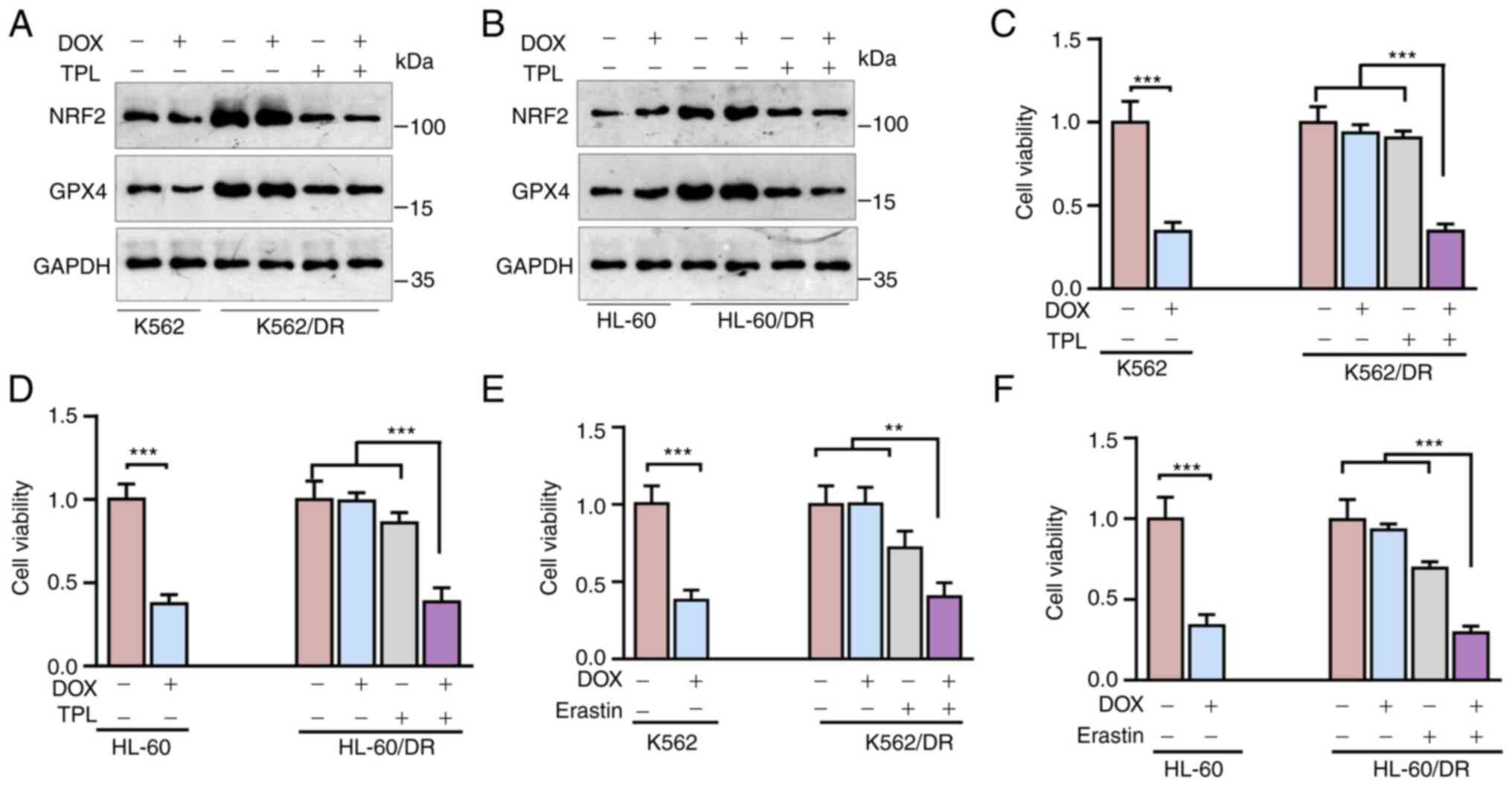|
1
|
Du Y and Chen B: Detection approaches for
multidrug resistance genes of leukemia. Drug Des Devel Ther.
11:1255–1261. 2017. View Article : Google Scholar : PubMed/NCBI
|
|
2
|
Yi Y, Gao L, Wu M, Ao J, Zhang C, Wang X,
Lin M, Bergholz J, Zhang Y and Xiao ZJ: Metformin sensitizes
leukemia cells to vincristine via activation of AMP-activated
protein kinase. J Cancer. 8:2636–2642. 2017. View Article : Google Scholar : PubMed/NCBI
|
|
3
|
Brunning RD: Classification of acute
leukemias. Semin Diagn Pathol. 20:142–153. 2003. View Article : Google Scholar : PubMed/NCBI
|
|
4
|
Sung H, Ferlay J, Siegel RL, Laversanne M,
Soerjomataram I, Jemal A and Bray F: Global cancer statistics 2020:
GLOBOCAN estimates of incidence and mortality worldwide for 36
cancers in 185 countries. CA Cancer J Clin. 71:209–249. 2021.
View Article : Google Scholar : PubMed/NCBI
|
|
5
|
Burnett AK, Kell J and Rowntree C: Acute
myeloid leukemia: Therapeutic indications. Curr Opin Hematol.
7:333–338. 2000. View Article : Google Scholar : PubMed/NCBI
|
|
6
|
Burnett A, Wetzler M and Löwenberg B:
Therapeutic advances in acute myeloid leukemia. J Clin Oncol.
29:487–494. 2011. View Article : Google Scholar : PubMed/NCBI
|
|
7
|
Wang HW, Ma KL, Liu H and Zhou JY:
Reversal of multidrug resistance in leukemia cells using a
transferrin-modified nanomicelle encapsulating both doxorubicin and
psoralen. Aging (Albany NY). 12:6018–6029. 2020. View Article : Google Scholar : PubMed/NCBI
|
|
8
|
Lothstein L, Israel M and Sweatman TW:
Anthracycline drug targeting: Cytoplasmic versus nuclear-a fork in
the road. Drug Resist Updat. 4:169–177. 2001. View Article : Google Scholar : PubMed/NCBI
|
|
9
|
Kruk I, Michalska T, Kładny J and
Kubera-Nowakowska L: Luminescence investigations of redox cycling
of adriamycin. Chemosphere. 44:83–90. 2001. View Article : Google Scholar : PubMed/NCBI
|
|
10
|
Davies GF, Roesler WJ, Juurlink BH and
Harkness TA: Troglitazone overcomes doxorubicin-resistance in
resistant K562 leukemia cells. Leuk Lymphoma. 46:1199–1206. 2005.
View Article : Google Scholar : PubMed/NCBI
|
|
11
|
Sakamoto H, Mashima T, Kizaki A, Dan S,
Hashimoto Y, Naito M and Tsuruo T: Glyoxalase I is involved in
resistance of human leukemia cells to antitumor agent-induced
apoptosis. Blood. 95:3214–3218. 2000. View Article : Google Scholar : PubMed/NCBI
|
|
12
|
Sakamoto H, Mashima T, Sato S, Hashimoto
Y, Yamori T and Tsuruo T: Selective activation of apoptosis program
by S-p-bromobenzylglutathione cyclopentyl diester in glyoxalase
I-overexpressing human lung cancer cells. Clin Cancer Res.
7:2513–2518. 2001.PubMed/NCBI
|
|
13
|
Xia CQ and Smith PG: Drug efflux
transporters and multidrug resistance in acute leukemia:
Therapeutic impact and novel approaches to mediation. Mol
Pharmacol. 82:1008–1021. 2012. View Article : Google Scholar : PubMed/NCBI
|
|
14
|
Altucci L, Clarke N, Nebbioso A,
Scognamiglio A and Gronemeyer H: Acute myeloid leukemia:
Therapeutic impact of epigenetic drugs. Int J Biochem Cell Biol.
37:1752–1762. 2005. View Article : Google Scholar : PubMed/NCBI
|
|
15
|
Waldmann T and Schneider R: Targeting
histone modifications-epigenetics in cancer. Curr Opin Cell Biol.
25:184–189. 2013. View Article : Google Scholar : PubMed/NCBI
|
|
16
|
Liu T, Guo Q, Guo H, Hou S, Li J and Wang
H: Quantitative analysis of histone H3 and H4 post-translational
modifications in doxorubicin-resistant leukemia cells. Biomed
Chromatogr. 30:638–644. 2016. View
Article : Google Scholar : PubMed/NCBI
|
|
17
|
Dixon SJ, Lemberg KM, Lamprecht MR, Skouta
R, Zaitsev EM, Gleason CE, Patel DN, Bauer AJ, Cantley AM, Yang WS,
et al: Ferroptosis: An iron-dependent form of nonapoptotic cell
death. Cell. 149:1060–1072. 2012. View Article : Google Scholar : PubMed/NCBI
|
|
18
|
Bebber CM, Müller F, Prieto Clemente L,
Weber J and von Karstedt S: Ferroptosis in cancer cell biology.
Cancers (Basel). 12:1642020. View Article : Google Scholar : PubMed/NCBI
|
|
19
|
Chen X, Kang R, Kroemer G and Tang D:
Broadening horizons: The role of ferroptosis in cancer. Nat Rev
Clin Oncol. 18:280–296. 2021. View Article : Google Scholar : PubMed/NCBI
|
|
20
|
Shi Z, Zhang L, Zheng J, Sun H and Shao C:
Ferroptosis: Biochemistry and biology in cancers. Front Oncol.
11:5792862021. View Article : Google Scholar : PubMed/NCBI
|
|
21
|
Su Y, Zhao B, Zhou L, Zhang Z, Shen Y, Lv
H, AlQudsy LHH and Shang P: Ferroptosis, a novel pharmacological
mechanism of anti-cancer drugs. Cancer Lett. 483:127–136. 2020.
View Article : Google Scholar : PubMed/NCBI
|
|
22
|
Cai J, Yi M, Tan Y, Li X, Li G, Zeng Z,
Xiong W and Xiang B: Natural product triptolide induces
GSDME-mediated pyroptosis in head and neck cancer through
suppressing mitochondrial hexokinase-II. J Exp Clin Cancer Res.
40:1902021. View Article : Google Scholar : PubMed/NCBI
|
|
23
|
Liu Q: Triptolide and its expanding
multiple pharmacological functions. Int Immunopharmacol.
11:377–383. 2011. View Article : Google Scholar : PubMed/NCBI
|
|
24
|
Pigneux A, Mahon FX, Uhalde M, Jeanneteau
M, Lacombe F, Milpied N, Reiffers J and Belloc F: Triptolide
cooperates with chemotherapy to induce apoptosis in acute myeloid
leukemia cells. Exp Hematol. 36:1648–1659. 2008. View Article : Google Scholar : PubMed/NCBI
|
|
25
|
Shao H, Ma J, Guo T and Hu R: Triptolide
induces apoptosis of breast cancer cells via a mechanism associated
with the Wnt/β-catenin signaling pathway. Exp Ther Med. 8:505–508.
2014. View Article : Google Scholar : PubMed/NCBI
|
|
26
|
Isharwal S, Modi S, Arora N, Uhlrich C
III, Giri B, Barlass U, Soubra A, Chugh R, Dehm SM, Dudeja V, et
al: Minnelide inhibits androgen dependent, castration resistant
prostate cancer growth by decreasing expression of androgen
receptor full length and splice variants. Prostate. 77:584–596.
2017. View Article : Google Scholar : PubMed/NCBI
|
|
27
|
Oliveira A, Beyer G, Chugh R, Skube SJ,
Majumder K, Banerjee S, Sangwan V, Li L, Dawra R, Subramanian S, et
al: Triptolide abrogates growth of colon cancer and induces cell
cycle arrest by inhibiting transcriptional activation of E2F. Lab
Invest. 95:648–659. 2015. View Article : Google Scholar : PubMed/NCBI
|
|
28
|
Philips BJ, Kumar A, Burki S, Ryan JP,
Noda K and D'Cunha J: Triptolide-induced apoptosis in non-small
cell lung cancer via a novel miR204-5p/Caveolin-1/Akt-mediated
pathway. Oncotarget. 11:2793–2806. 2020. View Article : Google Scholar : PubMed/NCBI
|
|
29
|
Noel P, Von Hoff DD, Saluja AK, Velagapudi
M, Borazanci E and Han H: Triptolide and its derivatives as cancer
therapies. Trends Pharmacol Sci. 40:327–341. 2019. View Article : Google Scholar : PubMed/NCBI
|
|
30
|
Ni WJ and Leng XM: Down-regulated miR-495
can target programmed cell death 10 in ankylosing spondylitis. Mol
Med. 26:502020. View Article : Google Scholar : PubMed/NCBI
|
|
31
|
Livak KJ and Schmittgen TD: Analysis of
relative gene expression data using real-time quantitative PCR and
the 2(−Delta Delta C(T)) method. Methods. 25:402–408. 2001.
View Article : Google Scholar : PubMed/NCBI
|
|
32
|
Niu W, Xu L, Li J, Zhai Y, Sun Z, Shi W,
Jiang Y, Ma C, Lin H, Guo Y and Liu Z: Polyphyllin II inhibits
human bladder cancer migration and invasion by regulating
EMT-associated factors and MMPs. Oncol Lett. 20:2928–2936. 2020.
View Article : Google Scholar : PubMed/NCBI
|
|
33
|
Tang X, Li X, Zhang D and Han W:
Astragaloside-IV alleviates high glucose-induced ferroptosis in
retinal pigment epithelial cells by disrupting the expression of
miR-138-5p/Sirt1/Nrf2. Bioengineered. 13:8240–8254. 2022.
View Article : Google Scholar : PubMed/NCBI
|
|
34
|
Deshmukh P, Unni S, Krishnappa G and
Padmanabhan B: The Keap1-Nrf2 pathway: Promising therapeutic target
to counteract ROS-mediated damage in cancers and neurodegenerative
diseases. Biophys Rev. 9:41–56. 2017. View Article : Google Scholar : PubMed/NCBI
|
|
35
|
Zipper LM and Mulcahy RT: Erk activation
is required for Nrf2 nuclear localization during pyrrolidine
dithiocarbamate induction of glutamate cysteine ligase modulatory
gene expression in HepG2 cells. Toxicol Sci. 73:124–134. 2003.
View Article : Google Scholar : PubMed/NCBI
|
|
36
|
Ma CS, Lv QM, Zhang KR, Tang YB, Zhang YF,
Shen Y, Lei HM and Zhu L: NRF2-GPX4/SOD2 axis imparts resistance to
EGFR-tyrosine kinase inhibitors in non-small-cell lung cancer
cells. Acta Pharmacol Sin. 42:613–623. 2021. View Article : Google Scholar : PubMed/NCBI
|
|
37
|
Kang Q and Yan S: Piperlongumine reverses
doxorubicin resistance through the PI3K/Akt signaling pathway in
K562/A02 human leukemia cells. Exp Ther Med. 9:1345–1350. 2015.
View Article : Google Scholar : PubMed/NCBI
|
|
38
|
Asano T, Tsutsuda-Asano A and Fukunaga Y:
Indomethacin overcomes doxorubicin resistance by decreasing
intracellular content of glutathione and its conjugates with
decreasing expression of gamma-glutamylcysteine synthetase via
promoter activity in doxorubicin-resistant leukemia cells. Cancer
Chemother Pharmacol. 64:715–721. 2009. View Article : Google Scholar : PubMed/NCBI
|
|
39
|
Nguyen T, Sherratt PJ, Huang HC, Yang CS
and Pickett CB: Increased protein stability as a mechanism that
enhances Nrf2-mediated transcriptional activation of the
antioxidant response element. Degradation of Nrf2 by the 26 S
proteasome. J Biol Chem. 278:4536–4541. 2003. View Article : Google Scholar : PubMed/NCBI
|
|
40
|
DeNicola GM, Karreth FA, Humpton TJ,
Gopinathan A, Wei C, Frese K, Mangal D, Yu KH, Yeo CJ, Calhoun ES,
et al: Oncogene-induced Nrf2 transcription promotes ROS
detoxification and tumorigenesis. Nature. 475:106–109. 2011.
View Article : Google Scholar : PubMed/NCBI
|
|
41
|
Asensio-López MC, Soler F, Pascual-Figal
D, Fernández-Belda F and Lax A: Doxorubicin-induced oxidative
stress: The protective effect of nicorandil on HL-1 cardiomyocytes.
PLoS One. 12:e01728032017. View Article : Google Scholar : PubMed/NCBI
|
|
42
|
Liu J, Mao W, Ding B and Liang CS:
ERKs/p53 signal transduction pathway is involved in
doxorubicin-induced apoptosis in H9c2 cells and cardiomyocytes. Am
J Physiol Heart Circ Physiol. 295:H1956–H1965. 2008. View Article : Google Scholar : PubMed/NCBI
|
|
43
|
Nam LB, Choi WJ and Keum YS: Triptolide
downregulates the expression of NRF2 target genes by increasing
cytoplasmic localization of NRF2 in A549 cells. Front Pharmacol.
12:6801672021. View Article : Google Scholar : PubMed/NCBI
|
|
44
|
Yu D, Liu Y, Zhou Y, Ruiz-Rodado V, Larion
M, Xu G and Yang C: Triptolide suppresses IDH1-mutated malignancy
via Nrf2-driven glutathione metabolism. Proc Natl Acad Sci USA.
117:9964–9972. 2020. View Article : Google Scholar : PubMed/NCBI
|


















